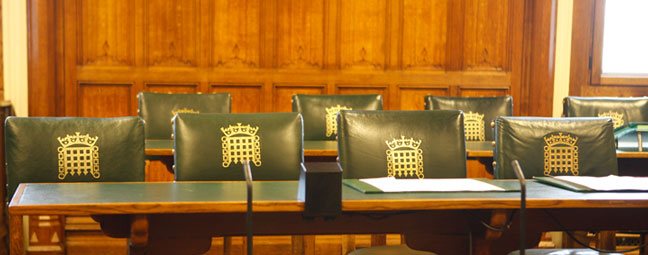Today’s guest post is from Emily Robertson, one of our new trainees who joined us in September. Less than two months into her job, Emily had the chance to visit Parliament for a Public Accounts Committee meeting, and offered to share her impressions with us.
 As a new trainee at the NAO, I am keen to try and explore new opportunities as much as possible and experience all aspects of the work that the NAO are involved in. As a part of this, I was lucky enough to attend my first Public Accounts Committee (PAC) meeting at Parliament a couple of weeks ago.
As a new trainee at the NAO, I am keen to try and explore new opportunities as much as possible and experience all aspects of the work that the NAO are involved in. As a part of this, I was lucky enough to attend my first Public Accounts Committee (PAC) meeting at Parliament a couple of weeks ago.The PAC is a group of MPs who hold meetings on the accounts of central government, and more specifically on the Comptroller and Auditor General’s (C&AG’s) Value for Money (VFM) reports. There are 15 MPs on the Committee and it is always chaired by a member of the opposition party – at this moment in time, Labour MP Meg Hillier. Committee members also represent the party proportions in Parliament.
The meetings give Parliament an opportunity to hold the relevant government department to account for their actions regarding how efficiently and effectively they are spending taxpayers’ money. The questions they ask are based on reports written by the NAO who are also there to answer any additional questions, if necessary. Some of the meetings have been known to get rather heated with MPs questioning departments on how taxpayers’ money is being spent.
In the Committee room, all MPs and a few representatives from the NAO, including Amyas Morse (C&AG), sit in a horseshoe shape in front of a panel of witnesses relevant to the given report. MPs are given a set timeframe to ask witnesses questions relevant to the report and it is all filmed and can be watched online as it is a matter of public interest.
Unusually, the meeting that I attended was based on 2 reports, both based around the Ministry of Defence (MoD). The session was about 2 hours long, spending 1 hour focusing on each report. The first was the military flying training programme – a project involving the MoD contracting out training of pilots to a company called Ascent. The project is 6 years behind schedule and has so far cost taxpayers £143 million. Due to the delays and lack of organisation of the project, the MPs were keen to understand where the project encountered problems and why, so this session was really interesting to watch as the Committee persistently questioned the value for money of the programme.
Having read the reports, it was really interesting to see the points the MPs decided to address and topics they wanted to know more about. Before the session, they are given guidance by the NAO team on the type of questions they could ask as the NAO know so much about the project from research carried out for the report. It was fascinating to see how the witnesses handled themselves and the pressure they were under in answering the Committee regarding their actions.
The second report was based on strategic financial management, which covered a much wider range of topics, such as the management of the defence estate and how the MoD was tracking savings it has made to reduce its budget since 2010. MPs again took it in turns to ask questions, nevertheless in each case there seemed to be one particular MP leading the questions with Meg Hillier refocusing the session if questions veered off track.
The whole experience was fascinating and I would recommend everybody making the effort to try and attend one – if you don’t get asked, show that you’re interested. Just one word of advice – if you do go, turn your phone off. I would not have wanted to be the woman who got told off by an MP, quite an embarrassing moment!!
Apply now!
Our 2016 graduate training scheme is now open to applications (deadline 31 January 2016). Head over to our graduate recruitment site for further information on how to apply.
If you’ve got any questions around the application process, please leave a comment below. You can also contact our recruitment team by email, via our Facebook page, or on Twitter.
